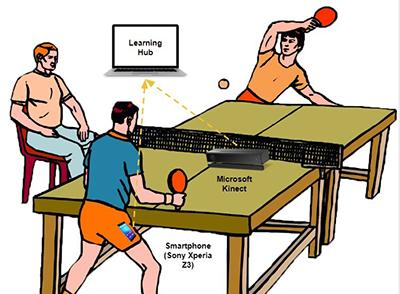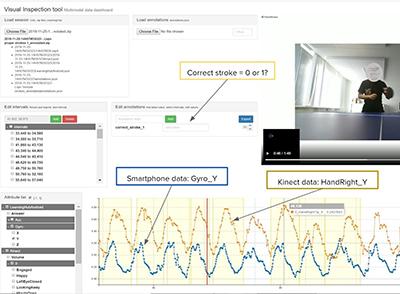Bibeg Limbu
What does table tennis have to do with educational technology? A lot more than you might think! Due to his membership to the Multimodal Learning Experiences group at the Open University Nederland, Bibeg Limbu, our researcher Augmented and Virtual Reality, came across an interesting study on this subject.
Artificial intelligence (AI) is increasingly used to support learning of complex psychomotor skills, such as those required when practicing sports or dancing. Learning complex psychomotor skills requires constant real-time feedback for novices. Also, this is vital to ensure that improper technique is not automated, hindering the long-term progress. However, mentors often do not have time to provide such feedback individually to all the trainees. AI can personalize training of complex psychomotor skills by providing adequate, real-time feedback during practice when mentors are not available.
As a part of his master thesis, Khaleel Asyraaf, under the supervision of the Multimodal Learning Experiences group researched how sensors and AI can be used to provide real-time feedback to help novices learn some of the fundamental techniques in table tennis, thus, addressing the shortage of mentors in training. Additionally, instead of relying on highly accurate but inaccessible sensors, built-in motion sensors in a smartphone were used to ensure wider adoption of the technology. Specifically, he used Long Short-Term Memory, a recurrent neural network, for the classification of the forehand table tennis stroke with data from the smartphones and Kinect. The neural network was trained and validated three times: 1) Smartphone, 2) Kinect, and 3) Smartphone + Kinect. Unsurprisingly, the results show that smartphone sensors alone perform subpar compared to the Kinect when placed in the non-dominant side pocket of the player. Nevertheless, the model improves when both of these devices are combined.


Though this research still requires extended work, it is a significant step towards providing a use case of how sensors and AI can be used to train complex psychomotor skills. Such works lay the foundations for new interactive mediums such as augmented and virtual reality (AR/VR) mediums which enable affordances for psychomotor learning.
AR/VR is one of our centre's core research topics, along with AIED (AI in Education) with pedagogic focus such as using these technologies for supporting collaboration. We are committed to unfold the full potential of AR/VR and understand the implications and potentials of the recent developments in the field of AI, especially for psychomotor learning. Such developments in AI and sensor technology can have a huge impact on contextual awareness of AR/VR systems enabling tighter integration of Intelligent tutoring system with AR/VR.
